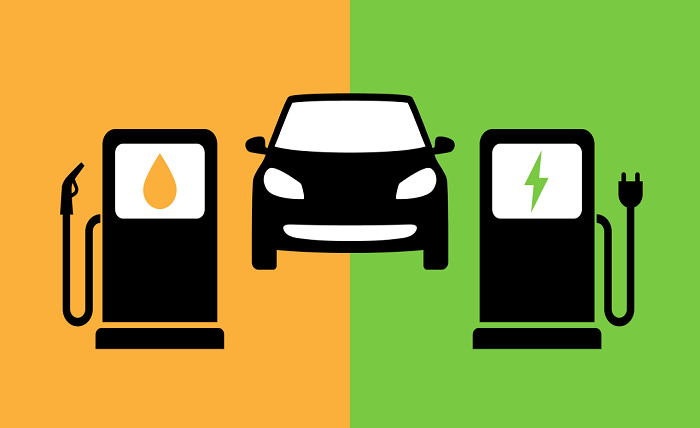Electric Cars vs. Traditional Vehicles: Which Is the Better Choice?

Introduction: The Growing Debate Between Electric and Traditional Cars
As the automotive industry continues to evolve, the debate between electric cars and traditional gasoline-powered vehicles has become more prominent than ever. With advancements in technology and a growing awareness of environmental concerns, consumers are increasingly considering electric vehicles (EVs) as a viable alternative to conventional cars. However, deciding between an electric car and a traditional vehicle involves weighing various factors, including cost, performance, environmental impact, and convenience.
In this article, we’ll explore the key differences between electric cars and traditional vehicles, helping you determine which option is the better choice for your needs. Whether you’re an eco-conscious driver or simply looking for the best value, understanding the pros and cons of each type of vehicle will guide you in making an informed decision. For those based in the UK, partnering with trusted Car Transport Companies London can simplify the process of moving your vehicle — whether it’s an electric or traditional car — across the city or nationwide.
1. Cost Comparison: Upfront and Long-Term Expenses
One of the most significant factors to consider when choosing between an electric car and a traditional vehicle is cost. Both the upfront purchase price and the long-term expenses can vary greatly depending on the type of vehicle you choose.
a. Upfront Costs
Electric cars typically have a higher upfront purchase price compared to traditional gasoline-powered vehicles. This is largely due to the cost of the batteries, which are a significant component of EVs. However, the gap between the prices of electric cars and traditional vehicles is gradually closing as battery technology improves and production costs decrease.
On the other hand, traditional vehicles tend to be more affordable initially, especially when considering the wide range of models and price points available in the market. However, it’s important to consider that the long-term savings associated with electric cars can offset the higher initial investment.
b. Long-Term Costs
When it comes to long-term costs, electric cars generally offer significant savings. EVs have lower operating costs due to the reduced need slot gacor hari ini for fuel and maintenance. Electricity is cheaper than gasoline, and electric cars have fewer moving parts, which means fewer components that require regular maintenance or replacement.
Traditional vehicles, while initially cheaper, often incur higher fuel and maintenance costs over time. Regular oil changes, engine tune-ups, and other routine services add up, making traditional cars more expensive to maintain in the long run.
2. Environmental Impact: Sustainability and Emissions
The environmental impact of a vehicle is an increasingly important consideration for many consumers. Electric cars and traditional vehicles differ significantly in terms of their environmental footprint.
a. Emissions
One of the most significant advantages of electric cars is their zero tailpipe emissions. EVs produce no exhaust gases, which helps reduce air pollution and greenhouse gas emissions. This makes electric cars a more environmentally friendly option, especially in regions where electricity is generated from renewable sources.
Traditional vehicles, on the other hand, rely on the combustion of fossil fuels, which produces carbon dioxide (CO2) and other harmful pollutants. These emissions contribute to global warming and poor air quality, making traditional cars a less sustainable choice in terms of environmental impact.
b. Energy Source
While electric cars are more environmentally friendly in terms of emissions, the source of the electricity used to charge them plays a crucial role in their overall sustainability. If the electricity is generated from renewable sources like wind, solar, or hydroelectric power, the environmental benefits of driving an electric car are maximized. However, if the electricity comes from coal or other fossil fuels, the environmental advantages are diminished.
Traditional vehicles, which run on gasoline or diesel, are entirely dependent on non-renewable fossil fuels, which have a more significant environmental impact over their lifecycle.
3. Performance and Driving Experience
Performance is another key area where electric cars and traditional vehicles differ. Understanding these differences can help you determine which type of vehicle best suits your driving needs and preferences.
a. Acceleration and Torque
Electric cars are known for their impressive acceleration and torque. Since electric motors deliver instant torque, EVs can accelerate quickly from a standstill, providing a smooth and responsive driving experience. This characteristic makes electric cars particularly enjoyable to drive in city traffic or on highways.
Traditional vehicles, while capable of high performance, often rely on gear changes and engine revs to deliver power, resulting in a different driving feel. While some drivers may prefer the sound and sensation of a traditional engine, others might appreciate the silent, smooth acceleration of an electric motor.
b. Range and Refueling
One of the most common concerns about electric cars is their range—the distance they can travel on a single charge. While the range of electric cars has improved significantly in recent years, it still varies depending on the model and driving conditions. For drivers who frequently take long road trips, range anxiety can be a concern.
Traditional vehicles generally offer a longer range per tank of fuel and have the advantage of a well-established refueling infrastructure. Gas stations are readily available, allowing drivers to refuel quickly and continue their journey without significant delays.
However, the charging infrastructure for electric cars is expanding rapidly, with more public charging stations becoming available across cities and highways. Additionally, advancements in fast-charging technology are reducing the time it takes to recharge an EV, making them more convenient for long-distance travel.
4. Convenience and Infrastructure
The convenience of owning and operating a vehicle is an important factor to consider, particularly when comparing electric cars to traditional vehicles.
a. Charging vs. Refueling
Charging an electric car at home is one of the most convenient aspects of EV ownership. With a home charging station, you can plug in your car spaceman demo overnight and wake up to a fully charged battery each morning. This eliminates the need for frequent trips to the gas station, saving time and effort.
However, for those who do not have access to a home charging station or live in areas with limited public charging infrastructure, charging an electric car can be less convenient than refueling a traditional vehicle.
Traditional vehicles, on the other hand, benefit from an extensive network of gas stations, making refueling quick and convenient. For drivers who prioritize convenience and do not want to worry about charging times or finding charging stations, a traditional vehicle may be more appealing.
b. Maintenance
Electric cars require less maintenance compared to traditional vehicles. With fewer moving parts and no need for oil changes, EVs are generally easier and cheaper to maintain. This can be a significant advantage for busy drivers who want a low-maintenance vehicle.
Traditional vehicles, while reliable, do require regular maintenance to keep them running smoothly. Engine oil changes, transmission fluid replacements, and other routine services are necessary to ensure the longevity of the vehicle.
5. Availability and Model Options
When it comes to variety and availability, traditional vehicles currently offer more options than electric cars. The automotive market is filled with a wide range of gasoline-powered vehicles, from compact cars and SUVs to luxury sedans and trucks. This variety allows consumers to find a vehicle that perfectly fits their needs, preferences, and budget.
Electric cars, while growing in popularity, still offer fewer model options compared to traditional vehicles. However, this is changing rapidly as more automakers introduce electric models to their lineups. From affordable electric hatchbacks to high-performance electric sports cars, the range of EVs available is expanding, providing more choices for consumers interested in making the switch.
For drivers planning an interstate move or vehicle relocation, working with reliable North Carolina Vehicle Shipping Companies can make the process of transporting electric or traditional cars far more convenient and cost-effective.
Conclusion: Which Is the Better Choice?
Choosing between an electric car and a traditional vehicle depends on your individual needs, priorities, and lifestyle. Electric cars offer clear advantages in terms of environmental impact, lower long-term costs, and an enjoyable driving experience with instant torque and smooth acceleration. They are particularly well-suited for eco-conscious drivers, those with access to home charging, and those looking for a low-maintenance vehicle.
On the other hand, traditional vehicles may still be the better choice for drivers who prioritize long-range driving, quick refueling, and a wider selection of models. They offer familiarity, convenience, and a well-established infrastructure that makes them a practical option for many consumers.
Ultimately, the best choice is the one that aligns with your personal values, driving habits, and long-term goals. As technology continues to advance and the automotive landscape evolves, both electric cars and traditional vehicles will play important roles in the future of transportation.




